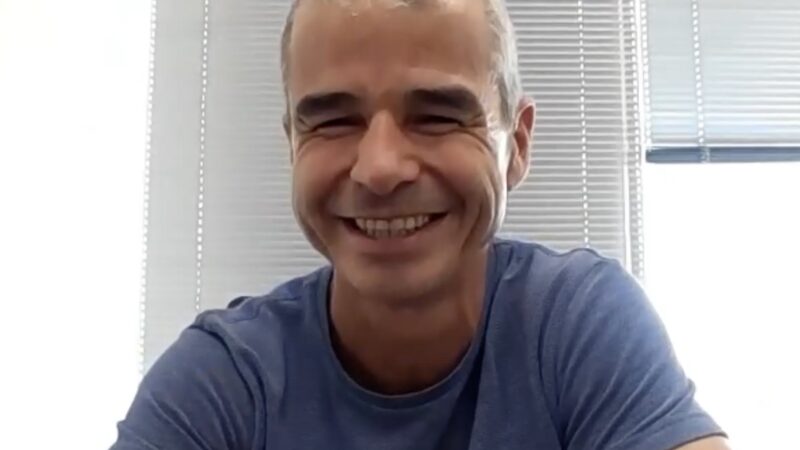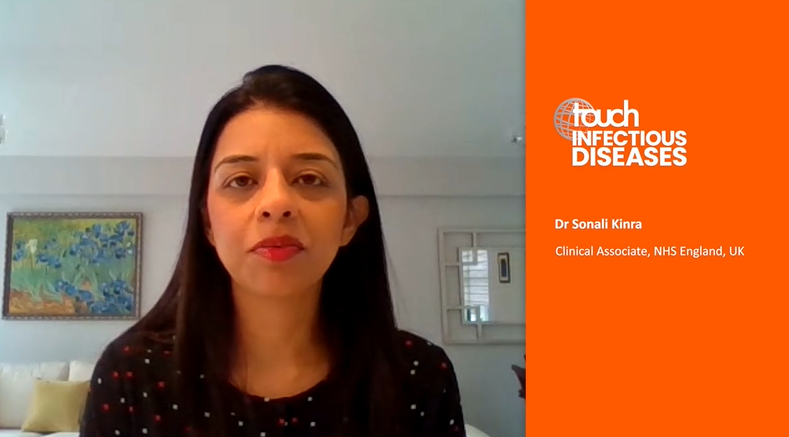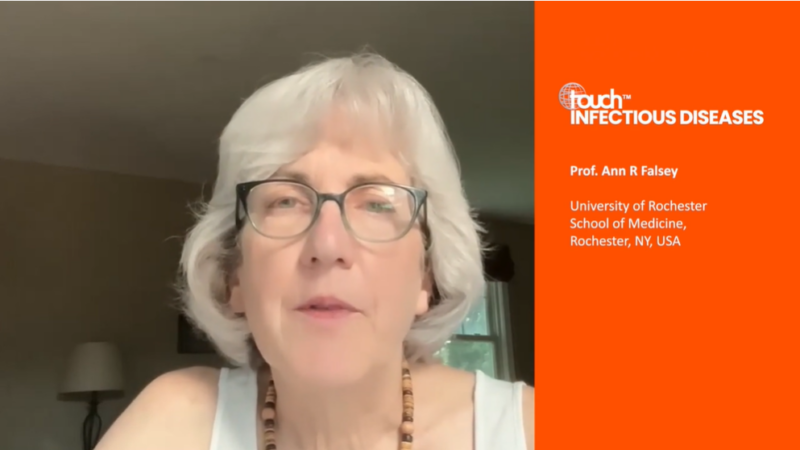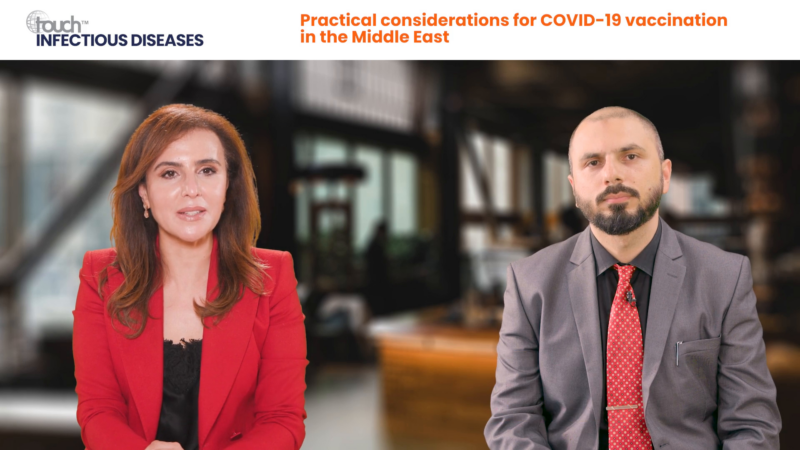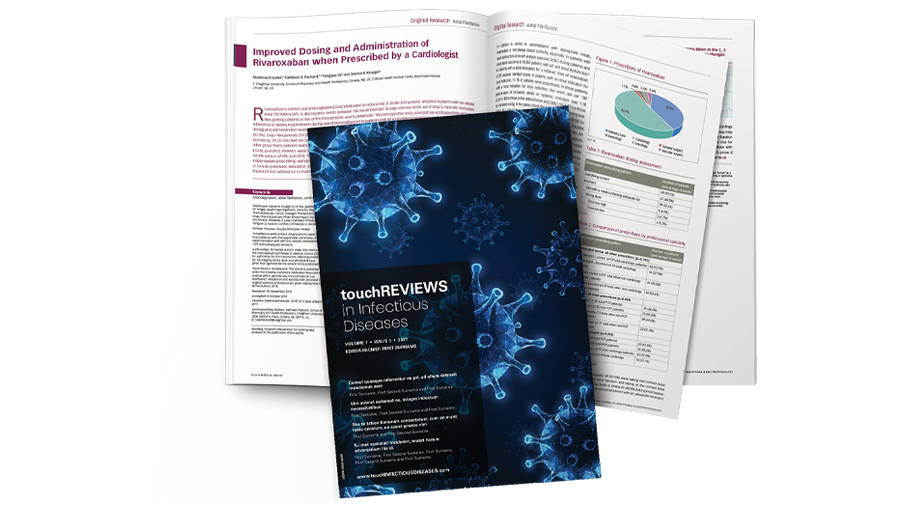touchIN CONVERSATION
 A relaxed discussion between two faculty focussed on real world clinical issues. Useful tips below will show how to navigate the activity. Join the conversation.
Close
A relaxed discussion between two faculty focussed on real world clinical issues. Useful tips below will show how to navigate the activity. Join the conversation.
Close
 A relaxed discussion between two faculty focussed on real world clinical issues. Useful tips below will show how to navigate the activity. Join the conversation.
Close
A relaxed discussion between two faculty focussed on real world clinical issues. Useful tips below will show how to navigate the activity. Join the conversation.
Close
Practical considerations for COVID-19 vaccination in the Middle East
Learning Objectives
After watching this activity, participants should be better able to:
- Outline the benefits and risks associated with COVID-19 vaccines
- Identify reasons for low COVID-19 vaccine uptake in the Middle East
- Discuss approaches to increase COVID-19 vaccine uptake, with a focus on the role of healthcare workers
Overview
In this activity, experts in infectious diseases respond to questions from the primary care, respiratory and infectious diseases communities on the reasons for low COVID-19 vaccine uptake in the Middle East, the benefits and risks of vaccination, and how healthcare workers can help to improve acceptance of the COVID-19 vaccine.
This activity is jointly provided by USF Health and touchIME. read more
Target Audience
Infectious disease specialists, respiratory disease specialists and primary care physicians involved in the management of COVID-19 infection.
Disclosures
USF Health adheres to the Standards for Integrity and Independence in Accredited Continuing Education. All individuals in a position to influence content have disclosed to USF Health any financial relationship with an ineligible organization. USF Health has reviewed and mitigated all relevant financial relationships related to the content of the activity. The relevant relationships are listed below. All individuals not listed have no relevant financial relationships.
Faculty
Dr Farhan Fazal has no interests/relationships or affiliations to disclose in relation to this activity.
Dr Nada Melhem has no interests/relationships or affiliations to disclose in relation to this activity.
Content reviewer
Sally F. Alrabaa, MD, has no financial interests/relationships or affiliations in relation to this activity.
Touch Medical Directors
Sola Neunie and Samantha Waite have no financial interests/relationships or affiliations in relation to this activity.
USF Health Office of Continuing Professional Development and touchIME staff have no financial interests/relationships or affiliations in relation to this activity.
Requirements for Successful Completion
In order to receive credit for this activity, participants must review the content and complete the post-test and evaluation form. Statements of credit are awarded upon successful completion of the post-test and evaluation form.
If you have questions regarding credit please contact cpdsupport@usf.edu.
Accreditations
Physicians
This activity has been planned and implemented in accordance with the accreditation requirements and policies of the Accreditation Council for Continuing Medical Education (ACCME) through a joint providership of USF Health and touchIME. USF Health is accredited by the ACCME to provide continuing medical education for physicians.
USF Health designates this enduring material for a maximum of 1.0 AMA PRA Category 1 CreditTM. Physicians should claim only the credit commensurate with the extent of their participation in the activity.
The European Union of Medical Specialists (UEMS) – European Accreditation Council for Continuing Medical Education (EACCME) has an agreement of mutual recognition of continuing medical education (CME) credit with the American Medical Association (AMA). European physicians interested in converting AMA PRA Category 1 CreditTM into European CME credit (ECMEC) should contact the UEMS (www.uems.eu).
Advanced Practice Providers
Physician Assistants may claim a maximum of 1.0 Category 1 credits for completing this activity. NCCPA accepts AMA PRA Category 1 CreditTM from organizations accredited by ACCME or a recognized state medical society.
The AANPCP accepts certificates of participation for educational activities approved for AMA PRA Category 1 CreditTM by ACCME-accredited providers. APRNs who participate will receive a certificate of completion commensurate with the extent of their participation.
Date of original release: 30 May 2023. Date credits expire: 30 May 2024.
If you have any questions regarding credit please contact cpdsupport@usf.edu.
To obtain the CE/CME credit(s) from this activity, please complete this post-activity test.
Claim CreditYou may also be interested in...

REGISTER NOW FOR FREE ACCESS TO
- 1000+ topical and insightful peer-reviewed journal articles
- 100+ hours of bite-sized congress highlights
- 9 major therapy areas packed with the latest scientific advances
- 150+ specialties offering learn-on-the-go medical education
- + Concise email updates and newsletters so you never miss out

Log into your Touch Account
Earn and track your CME credits on the go, save articles for later, and follow the latest congress coverage.
Sign up with an Email
Or use a .
This Functionality is for
Members Only
Explore the latest in medical education and stay current in your field. Create a free account to track your learning.












